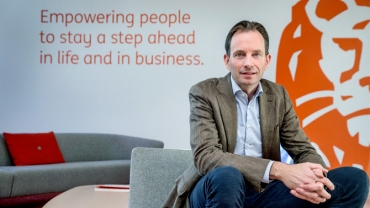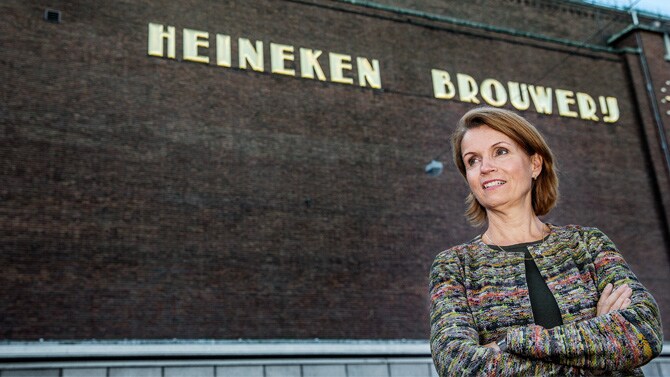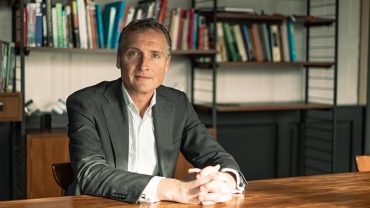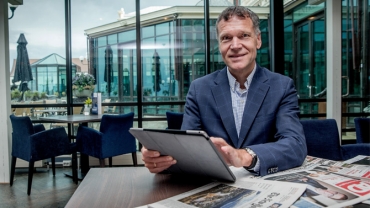
Financial transformation becoming business transformation
At Heineken, the transformation process to prepare for the “future of finance” started relatively late, but now a clear finance strategy gives direction for four focus areas. “Our financial transformation is actually becoming a business transformation,” says Ulrika Carlsson, Heineken’s Senior Director Global Finance Processes, when we spoke to her at the end of October 2019. “It affects the whole company, and it’s nice to see that by working hard you can make sure the culture goes along with it.”
Transformation as the common theme
After completing her Master’s degree in Business Administration and Economics at the Stockholm School of Economics, Ulrika Carlsson continued her studies at the University of Michigan, where she met her Dutch husband, with whom she then moved to the Netherlands. She has spent her entire working career in various financial positions. First, for example, she “did” corporate treasury, including at Sara Lee/Douwe Egberts and at the former Van Leer Industrial Packaging. After that, she took on all kinds of worldwide roles with Cisco Systems for almost sixteen years. She set up corporate treasury for Europe, EMEA and Asia, and worked on shared services, people outsourcing, accounting & reporting, corporate control, corporate finance, and business control. Since early 2016, Ms Carlsson has been responsible at Heineken for the financial processes, systems, shared service operations, and – until very recently – internal control and risk management. A very wide-ranging portfolio, with transformation as the common theme.
Finance benefits from economies of scale and standardisation
When Ulrika Carlsson joined Heineken, she discovered that all the operating companies (OpCos) and all the systems, processes, and guidelines were managed locally. “It is true that we’re talking about all kinds of individual large companies here,” is Ms Carlsson’s nuanced comment, “but with a view to the future, everyone now agrees that such a decentralised, unconnected approach is not sufficient for remaining competitive in an increasingly digital world. In a number of areas, including finance, you can benefit from economies of scale and standardisation. Why, for example, would your payment or cash management processes or your invoicing processes be different in one country to in another? Where you can standardise, you need to do it. That’s actually the essence of my work.”
Heineken has to remain successful and competitive
Ms Carlsson’s first challenge was to take the shared service centre (SSC) for 26 OpCos in Krakow (Poland) to the next level. Heineken had reviewed the transactional finance processes and transferred them – “lift and shift” – to the SSC for each country. “Each country had its own approach and its own tools. So we did actually have an SSC, but the only thing that was really shared was the building,” she says with a smile. “What we’ve done over the past few years – and are still doing – is get the basis in order, structure it, and standardise it. We’re constantly working on the issue of where Heineken needs to go in the future, and how you need to set up the company so as to remain truly successful and competitive.”
Heineken’s service delivery and how it uses the SSC will be completely different. In the future, processes that are still carried out manually – such as drawing up spreadsheets or handling phone calls and e-mails – will be automated. Robotic process automation will take over some of the transactional services. “We intend deploying the employees in our SSC for that transformation,” says Ms Carlsson. Because the step forward from where we are now to where we want to go is a really big one. There is still a lot of legacy, and we still have a lot of things to do, such as optimising data and standardising working methods. In short, its far more than just a matter of ‘fixing the basics’. It demands very different skills from our people, such as reporting capabilities, providing insights and analytics, and tax accounting. You also have to deal a lot more with data, system and tools maintenance.”

“Transforming always involves two steps forward and one step back. To get people on board, you have to make things transparent and quantifiable. You have to translate your vision into what it actually means in the workplace. What do we need so as to make the target state possible? And how can we do it? When I announced to the OpCos that they needed to start on a really massive project, it meant extra work for them. So you have to get people on board effectively as regards why we’re doing it, where it’ll lead to, and why it’s important for us. That’s possible, but I don’t think you can ever give it enough time and attention."
Finance strategy: a driver for the transformation
Heineken’s Finance Leadership Team has drawn up a finance strategy, a target state for guiding the shared services and transactional finance processes to the next level. “Reinforcing our foundations means strengthening our core financial processes, unlocking the value of data, and embedding risk management. We are striving for end-to-end value by accelerating value creation, implementing integrated business planning, and putting sustainability first in all our decisions. We recognise the value of digital and we want to digitise our financial processes as much as possible, generate simple and user-friendly insights, and derive value from new business models. Finally, we want to enable our employees to develop, so that we as an organisation can respond quickly and easily to changes and challenges. That includes promoting inclusiveness and diversity, as well as making our employees’ skills future-proof. This finance strategy, which in future can also be used for other business processes, is a model that has helped us get the transformation going.”
Metamorphosis in customer intimacy
The reason that Heineken started the transformation relatively late had to do with the company’s local and customer-oriented approach. Ms Carlsson explains: “Heineken has always been run on a very decentralised basis, and has always been successful in doing so. People used to say: ‘We get the basics right, and that’s been working fine for the past 150 years’. Heineken’s strength was always that it was entrepreneurial but also truly local. It used to be that sales representatives would go out to the pubs, have a cup of coffee or a beer with the owner, and take the order. But these days those pub owners want to be able to do that from home on their smartphone. There’s still the customer intimacy, but in a different form. Customer expectations are changing. If placing an order is too complicated, too old-fashioned, or takes too long, then they’ll switch to our competitors. Simply clinging to ‘Heineken tastes great and we want to sell it’ simply isn’t enough anymore. Besides, transformation – if every country does it for itself – is terribly expensive. All these reasons together have encouraged the transformation, especially in transactional finance. The world is changing fast, and to stay close to its customers, Heineken has to keep up those changes.”

"The reason that Heineken started the transformation relatively late had to do with the company’s local and customer-oriented approach. Heineken has always been run on a very decentralised basis, and has always been successful in doing so. People used to say: ‘We get the basics right, and that’s been working fine for the past 150 years’. Heineken’s strength was always that it was entrepreneurial but also truly local. It used to be that sales representatives would go out to the pubs, have a cup of coffee or a beer with the owner, and take the order. But these days those pub owners want to be able to do that from home on their smartphone. There’s still the customer intimacy, but in a different form."
Making things transparent and quantifiable so as to get people on board
“I think we’ve already made good progress in the transformation process,” says Ms Carlsson. “Transforming always involves two steps forward and one step back. To get people on board, you have to make things transparent and quantifiable. You have to translate your vision into what it actually means in the workplace. What do we need so as to make the target state possible? And how can we do it? When I announced to the OpCos that they needed to start on a really massive project, it meant extra work for them. So you have to get people on board effectively as regards why we’re doing it, where it’ll lead to, and why it’s important for us. That’s possible, but I don’t think you can ever give it enough time and attention. You have to offer transparency and take people along with you as regards the ‘why?’ aspect. You have to make them understand that they’re part of a team, what steps there are in the process, and who’s responsible for what. You have to talk to everybody, in the workplace, and be really transparent about it. No complicated PowerPoints! At Heineken, we sent out ‘flying squads’ to assist the OpCos, help them fix the basics, and explain that if Heineken didn’t go where the world is going with digital and online, we’d lose competitiveness and be unable to serve our customers properly. Specific examples are also very effective. I once asked our Leadership Forum (the top 120 people in the company): ‘When was the last time you opened a bill at home and then made a payment?’ You could see them thinking: ‘Envelope? Bill? I don’t get post anymore…’ And then I pointed out ‘Exactly! But Heineken still receives a very large proportion of all bills by post’. Then you see the amazement: ‘That can’t be true, can it?!’”
From fixing the basics to the next level up
“What I’m mostly proud of is our ‘target state’. That’s a kind of cookbook that indicates where we’re going in our transactional processes. We know where our SSC is going, we have a global process organisation that displays ownership, we have a strategy for our processes at a global level, we know what our most important KPIs are and what the ultimate ambition of our processes is. We can now really proceed from ‘fix the basics’ to the next level up, and ultimately achieve new business results. Our climate and ‘voice of the customer’ surveys have improved every year since the transformation, showing that a real cultural and business development is taking place. That energises me, because I’m here to ensure that Heineken is successful and can remain competitive. Our financial transformation is actually becoming a business transformation: at the end of the day, you’re talking to the sales organisation about the tools and the data, and how we’re going to close our deals. It really affects the whole company. It’s a lot of hard work, but it’s great to see that you can make sure the culture goes along with it.”
Finance is integrating far more with business
The financial transformation that’s becoming a business transformation shows that the boundaries of finance are increasingly disappearing. Ulrika Carlsson predicts: “In ten years’ time, you won’t really have a financial function like you have now. It will be far more integrated with your business. You will have small expertise groups, of course, but increasingly you need people who have more business acumen and who can identify even better with the company and the business processes. People who are versatile and have digital skills will be important – people who feel at home with computers and the Internet, who like to do stuff online and can deal with data, and know how to turn data into insights and advice. They’ll be people who participate much more in partnerships with their business leaders, with their salespeople, with their managing directors, and with their supply chain. Everything will be more coordinated: processes, employees, skills, the way you’re organised, KPIs, dashboards and reports, the technology you apply, and our customer experience. Because ultimately it’s all about how you deal with your customers, especially in the digital age, where your front office and your back office are fully integrated. As a finance professional, you need to be very outward-looking: you have to learn from your peers and from other companies’ best practices, take interesting articles and insights from the Internet, knowledge networks and consultancies, and create a think tank during a transformation process. In short, acquire knowledge in different ways and valorise it, so that you can continually improve your processes, enable your people to grow, and offer your customers the best possible experience.”
Contact us






















